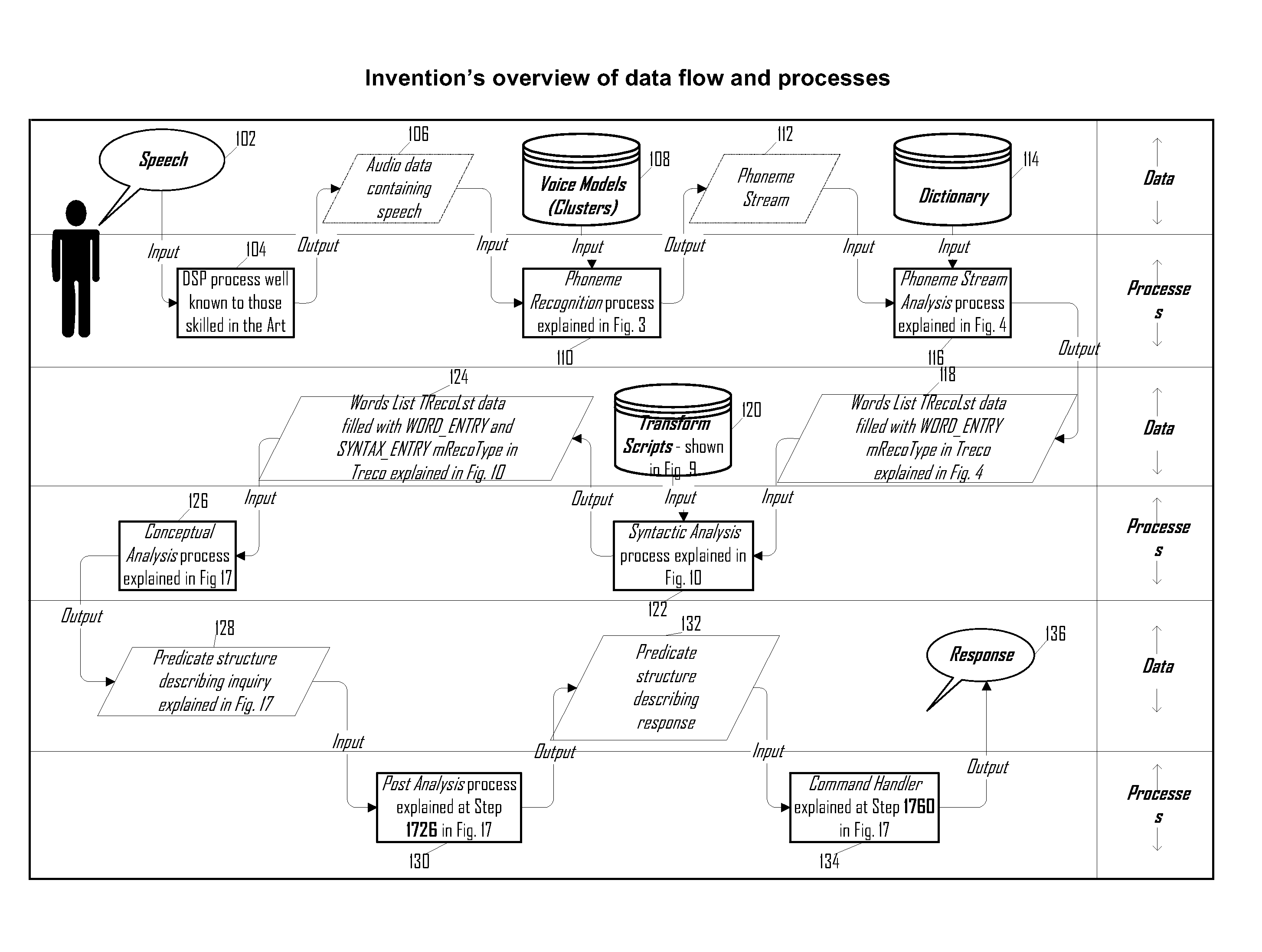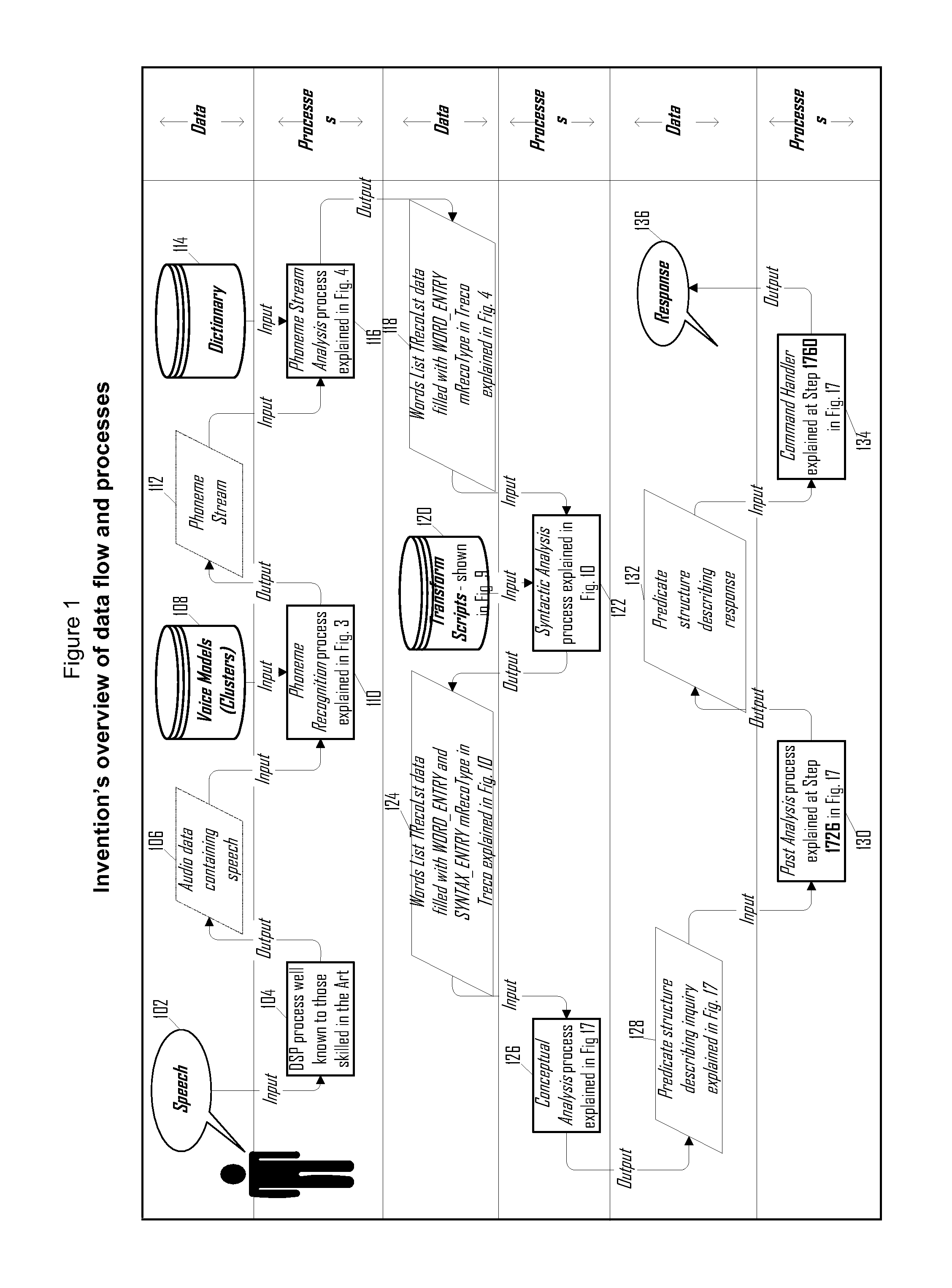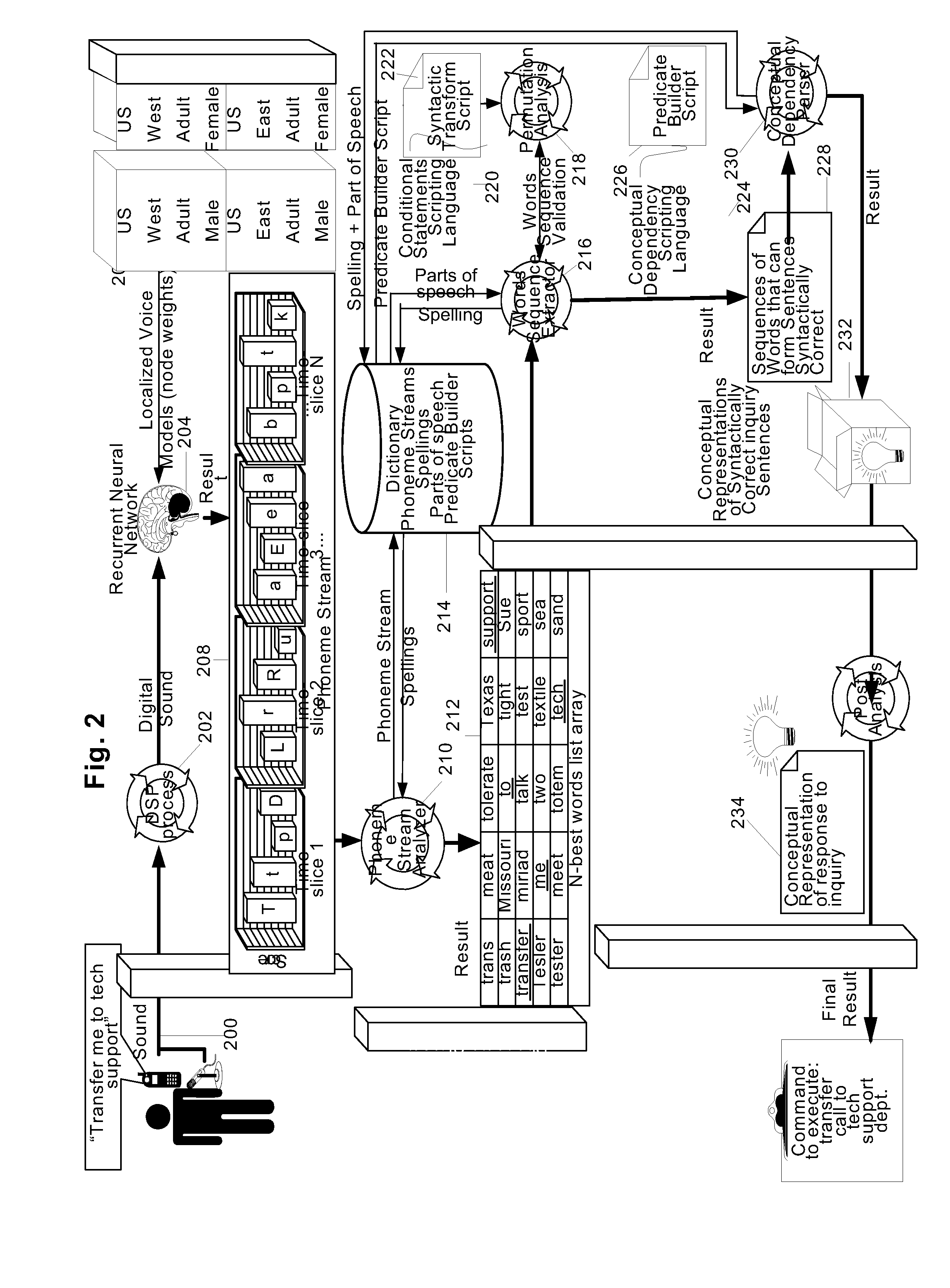Conceptual analysis driven data-mining and dictation system and method
a data mining and data-dictation technology, applied in the field of speech processing, can solve the problems of increasing the cost of information providers, reducing the accuracy of information sources, and consuming time-consuming processes
- Summary
- Abstract
- Description
- Claims
- Application Information
AI Technical Summary
Benefits of technology
Problems solved by technology
Method used
Image
Examples
example 1
[0565]The following inquiry was input into an embodiment of the system and method of the invention, with the corresponding response based on the reference data contained from the flight database. The data was processed using a 2.4 GHz Pentium 4 computer that has 1 GB of RAM.
[0566]Q: Is flight six hundred delayed?
[0567]A: United Airline flight 600 arrived at 2 32 PM and was late by 12 minutes.
[0568]Syntactic organization:
[0569]Spelling: is flight 600 delayed
[0570]is flight 600 delayed <- [SENTENCE, SENTENCE CONSTRUCTION 1, level 0, index −1]
[0571]is flight 600 delayed <- [VERB_PHRASE, VERB PHRASE CONSTRUCTION 9, level 1, index 0]
[0572]is flight 600 <- [VERB_PHRASE, VERB PHRASE CONSTRUCTION 1, level 2, index 0]
[0573]is <- [VERB, WORD, level 3, index 0]
[0574]flight 600 <- [NOUN_PHRASE, PLAIN NOUN PHRASE CONSTRUCTION, level 3, index 1]
[0575]flight 600 <- [NOUN, FLIGHT INTEGRATION, level 4, index 0]
[0576]flight 600 <- [FLIGHT, FLIGHT IDENTIFICATION CONSTRUCTION 2, level 5, index 0]
[0577]...
example 2
[0628]Similar to Example 1, the following inquiry was input into the same system, with the indicated response.
[0629]Q: When did flight one twenty two leave?
[0630]A: US airways flight 122 left at 1 23 PM.
[0631]Syntactic organization:
[0632]Spelling: when did flight 122 leave
[0633]when did flight 122 leave <- [SENTENCE, SENTENCE CONSTRUCTION 1, level 0, index −1]
[0634]when did flight 122 leave <- [VERB_PHRASE, VERB PHRASE CONSTRUCTION 10, level 1, index 0]
[0635]when <- [WH_PRONOUN, WORD, level 2, index 0]
[0636]did flight 122 leave <- [VERB_PHRASE, VERB PHRASE CONSTRUCTION 7, level 2, index 1]
[0637]did <- [VERB, WORD, level 3, index 0]
[0638]flight 122 <- [NOUN_PHRASE, PLAIN NOUN PHRASE CONSTRUCTION, level 3, index 1]
[0639]flight 122 <- [NOUN, FLIGHT INTEGRATION, level 4, index 0]
[0640]flight 122 <- [FLIGHT, FLIGHT IDENTIFICATION CONSTRUCTION 2, level 5, index 0]
[0641]flight <- [NOUN, WORD, level 6, index 0]
[0642]122 <- [CARDINAL_NUMBER, WORD, level 6, index 1]
[0643]1 <- [CARDINAL_NUMBER...
example 3
[0695]The following inquiry was made into the same system as Examples 1 and 2, with the indicated response.
[0696]Q: Has united airlines flight six hundred arrived yet?
[0697]A: Yes, United Airline flight 600 arrived at 2 32 PM.
[0698]Syntactic organization:
[0699]Spelling: has United airlines flights 600 arrived yet
[0700]has United airlines flights 600 arrived yet <- [SENTENCE, SENTENCE CONSTRUCTION 1, level 0, index −1]
[0701]has United airlines flights 600 arrived yet <- [VERB_PHRASE, VERB PHRASE CONSTRUCTION 5, level 1, index 0]
[0702]has <- [VERB, WORD, level 2, index 0]
[0703]United airlines flights 600 <- [NOUN_PHRASE, PLAIN NOUN PHRASE CONSTRUCTION, level 2, index 1]
[0704]United airlines flights 600 <- [NOUN, FLIGHT INTEGRATION, level 3, index 0]
[0705]United airlines flights 600 <- [FLIGHT, FLIGHT IDENTIFICATION CONSTRUCTION 2, level 4, index 0]
[0706]United airlines <- [AIRLINE, AIRLINE IDENTIFICATION, level 5, index 0]
[0707]United <- [AIRLINE, WORD, level 6, index 0]
[0708]airlines...
PUM
 Login to View More
Login to View More Abstract
Description
Claims
Application Information
 Login to View More
Login to View More - R&D
- Intellectual Property
- Life Sciences
- Materials
- Tech Scout
- Unparalleled Data Quality
- Higher Quality Content
- 60% Fewer Hallucinations
Browse by: Latest US Patents, China's latest patents, Technical Efficacy Thesaurus, Application Domain, Technology Topic, Popular Technical Reports.
© 2025 PatSnap. All rights reserved.Legal|Privacy policy|Modern Slavery Act Transparency Statement|Sitemap|About US| Contact US: help@patsnap.com



